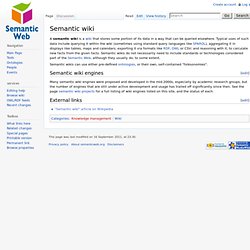

Web 3.0. Semantic Web. The Semantic Web is a collaborative movement led by international standards body the World Wide Web Consortium (W3C).[1] The standard promotes common data formats on the World Wide Web.

By encouraging the inclusion of semantic content in web pages, the Semantic Web aims at converting the current web, dominated by unstructured and semi-structured documents into a "web of data". The Semantic Web stack builds on the W3C's Resource Description Framework (RDF).[2] According to the W3C, "The Semantic Web provides a common framework that allows data to be shared and reused across application, enterprise, and community boundaries".[2] The term was coined by Tim Berners-Lee for a web of data that can be processed by machines.[3] While its critics have questioned its feasibility, proponents argue that applications in industry, biology and human sciences research have already proven the validity of the original concept. History[edit] Purpose[edit] Limitations of HTML[edit] Semantic Web solutions[edit] Semantic Web. I have an idea that I think is very important but I haven’t yet polished to the point where I’m comfortable sharing it.

I’m going to share it anyway, unpolished, because I think it’s that useful. So here I am, handing you a dull, gray stone, and I’m saying there’s a diamond inside. Maybe even a dilithium crystal. My hope is that a few experts will see what I see and help me safely extract it. Or maybe someone has already extracted it, and they can just show me. The problem I’m trying to solve is at the core of decentralized (or loosely-coupled) systems.
RDF offers a solution to this, but it turns out to be pretty hard to put into practice. Consider two on-the-web temperature sensors: The careful human reader will immediately wonder whether these temperatures are in Celcius or Fahrenheit, or if maybe the first is in Celcius and the second Fahrenheit. Here’s the first sketch of my solution: I know it looks ugly, but now it’s clear that both readings are in Fahrenheit. I’m not sure yet. No. Semantic wiki. A semantic wiki is a wiki that stores some portion of its data in a way that can be queried elsewhere.

Typical uses of such data include querying it within the wiki (sometimes using standard query languages like SPARQL), aggregating it in displays like tables, maps and calendars; exporting it via formats like RDF, OWL or CSV; and reasoning with it, to calculate new facts from the given facts. Semantic wikis do not necessarily need to include standards or technologies considered part of the Semantic Web, although they usually do, to some extent. Semantic wikis can use either pre-defined ontologies, or their own, self-contained "folksonomies". [edit] Semantic wiki engines Many semantic wiki engines were proposed and developed in the mid-2000s, especially by academic research groups, but the number of engines that are still under active development and usage has trailed off significantly since then.
[edit] External links "Semantic wiki" article on Wikipedia.